货币金融学演讲
金融业演讲稿文字版范文
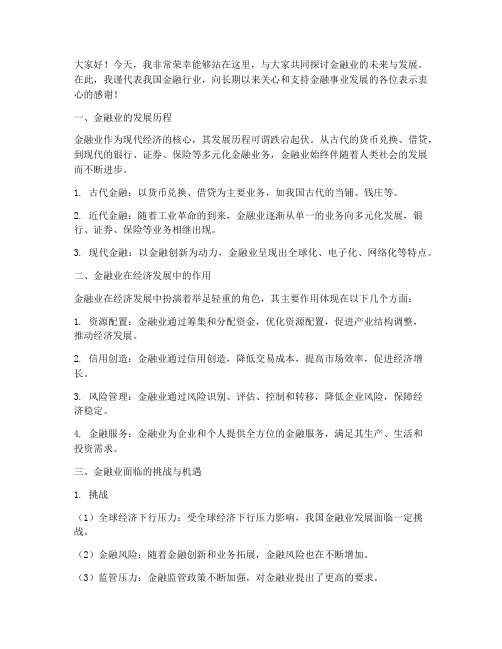
大家好!今天,我非常荣幸能够站在这里,与大家共同探讨金融业的未来与发展。
在此,我谨代表我国金融行业,向长期以来关心和支持金融事业发展的各位表示衷心的感谢!一、金融业的发展历程金融业作为现代经济的核心,其发展历程可谓跌宕起伏。
从古代的货币兑换、借贷,到现代的银行、证券、保险等多元化金融业务,金融业始终伴随着人类社会的发展而不断进步。
1. 古代金融:以货币兑换、借贷为主要业务,如我国古代的当铺、钱庄等。
2. 近代金融:随着工业革命的到来,金融业逐渐从单一的业务向多元化发展,银行、证券、保险等业务相继出现。
3. 现代金融:以金融创新为动力,金融业呈现出全球化、电子化、网络化等特点。
二、金融业在经济发展中的作用金融业在经济发展中扮演着举足轻重的角色,其主要作用体现在以下几个方面:1. 资源配置:金融业通过筹集和分配资金,优化资源配置,促进产业结构调整,推动经济发展。
2. 信用创造:金融业通过信用创造,降低交易成本,提高市场效率,促进经济增长。
3. 风险管理:金融业通过风险识别、评估、控制和转移,降低企业风险,保障经济稳定。
4. 金融服务:金融业为企业和个人提供全方位的金融服务,满足其生产、生活和投资需求。
三、金融业面临的挑战与机遇1. 挑战(1)全球经济下行压力:受全球经济下行压力影响,我国金融业发展面临一定挑战。
(2)金融风险:随着金融创新和业务拓展,金融风险也在不断增加。
(3)监管压力:金融监管政策不断加强,对金融业提出了更高的要求。
2. 机遇(1)金融科技发展:金融科技的发展为金融业带来新的机遇,如移动支付、区块链等。
(2)金融市场开放:我国金融市场对外开放,为金融业带来更多合作机会。
(3)国家政策支持:国家政策对金融业发展给予大力支持,为金融业提供良好的发展环境。
四、金融业的发展趋势1. 金融科技与金融业务深度融合:金融科技将推动金融业务创新,提升金融服务水平。
2. 金融监管趋严:金融监管政策将更加严格,金融业将面临更大的合规压力。
货币金融学课件米什金讲述

2-5
Structure of Financial Markets 金融市场的结构
• Exchanges and Over-the-Counter (OTC) Markets 交易所和场外交易(柜台交易)市场
Copyright © 2010 Pearson Addison-Wesley. All rights reserved.
2-14
Regulation of the Financial System 金融体系的监管
• To increase the information available to © 2010 Pearson Addison-Wesley. All rights reserved.
2-12
Table 3 Primary Assets and Liabilities of Financial Intermediaries 表2-3 金融中介机构主要的资产和负债
• Debt and Equity Markets 债务市场和股权市
场
– Debt instruments (maturity) 债务工具(期限) – Equities (dividends) 股权(股息或红利)
• Primary and Secondary Markets
一级市场和二级市场
– Investment Banks underwrite securities in primary markets 投资银行在一级市场中承销证券 – Brokers and dealers work in secondary markets 经纪人和交易商在二级市场中经营业务
金融学英语演讲稿范文
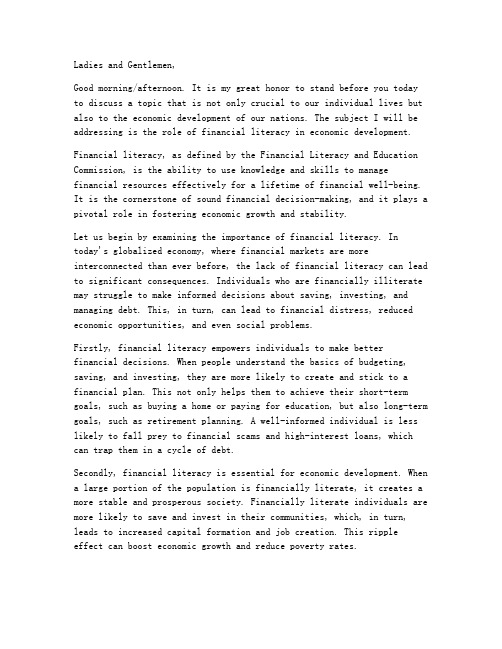
Ladies and Gentlemen,Good morning/afternoon. It is my great honor to stand before you today to discuss a topic that is not only crucial to our individual lives but also to the economic development of our nations. The subject I will be addressing is the role of financial literacy in economic development.Financial literacy, as defined by the Financial Literacy and Education Commission, is the ability to use knowledge and skills to manage financial resources effectively for a lifetime of financial well-being. It is the cornerstone of sound financial decision-making, and it plays a pivotal role in fostering economic growth and stability.Let us begin by examining the importance of financial literacy. Intoday's globalized economy, where financial markets are more interconnected than ever before, the lack of financial literacy can lead to significant consequences. Individuals who are financially illiterate may struggle to make informed decisions about saving, investing, and managing debt. This, in turn, can lead to financial distress, reduced economic opportunities, and even social problems.Firstly, financial literacy empowers individuals to make betterfinancial decisions. When people understand the basics of budgeting, saving, and investing, they are more likely to create and stick to a financial plan. This not only helps them to achieve their short-term goals, such as buying a home or paying for education, but also long-term goals, such as retirement planning. A well-informed individual is less likely to fall prey to financial scams and high-interest loans, which can trap them in a cycle of debt.Secondly, financial literacy is essential for economic development. When a large portion of the population is financially literate, it creates a more stable and prosperous society. Financially literate individuals are more likely to save and invest in their communities, which, in turn, leads to increased capital formation and job creation. This rippleeffect can boost economic growth and reduce poverty rates.Thirdly, financial literacy fosters innovation and entrepreneurship. When individuals understand how to manage their finances, they are more likely to take risks and start their own businesses. This entrepreneurial spirit is a key driver of economic development and can lead to the creation of new industries, products, and services.Now, let us delve into the challenges that hinder the spread offinancial literacy. One of the main challenges is the lack of access to quality financial education. In many countries, particularly in developing regions, there is a lack of resources and infrastructure to provide comprehensive financial education to the general population. This is often compounded by cultural barriers and a lack of awareness about the importance of financial literacy.Moreover, financial literacy is not just about teaching people how to manage their finances; it is also about fostering a mindset of financial responsibility and resilience. This requires a multi-faceted approach, including the development of curricula, the training of educators, and the collaboration between governments, financial institutions, and non-profit organizations.To address these challenges, several initiatives have been launched worldwide. For instance, many countries have introduced financial literacy programs in schools, ensuring that students receive basic financial education at a young age. Additionally, there are numerous online resources, mobile applications, and workshops designed to help adults improve their financial literacy.In conclusion, the role of financial literacy in economic development cannot be overstated. It is a critical factor in achieving financial well-being, fostering economic growth, and reducing poverty. As we move forward, it is imperative that we continue to invest in financial literacy programs and initiatives.Ladies and gentlemen, here are some key points to consider:1. Financial literacy empowers individuals to make informed financial decisions.2. Financial literacy is essential for economic development and stability.3. Financial literacy fosters innovation and entrepreneurship.4. The lack of access to quality financial education is a significant challenge.5. Initiatives such as school programs, online resources, and workshops are essential in promoting financial literacy.In closing, I urge you to take an active role in promoting financial literacy within your communities. Whether you are a teacher, a business leader, or a government official, there are ways to contribute to this noble cause. By doing so, we can create a more financially literate and prosperous world.Thank you for your attention, and I welcome any questions or comments you may have.[End of Speech]。
《货币金融学〉讲》课件
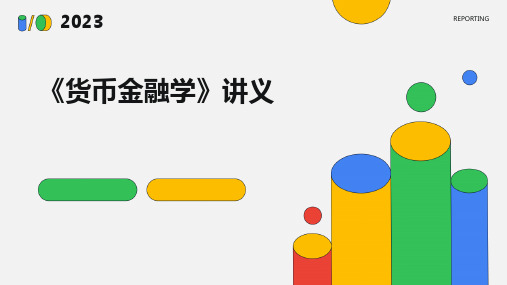
政府部门在金融市场中扮演着监管者的角色,通过制定相关法律法规来规范市场行为。 中央银行则负责实施货币政策,调节经济运行。金融机构是市场的中介,包括商业银行 、投资银行、保险公司等,为企业和个人提供金融服务。企业和个人则是市场的参与主
体,通过投资和融资活动参与金融市场的运作。
2023
PART 02
货币需求的决定因素
总结词
货币需求的决定因素主要包括经济活动 水平、物价水平、利率水平等。
VS
详细描述
经济活动水平是指一定时期内生产和消费 活动的总量,经济活动水平越高,对货币 的需求量越大。物价水平是指一定时期内 一般物价水平的变动情况,物价水平越高 ,对货币的需求量越大。利率水平是指一 定时期内资金的使用成本,利率水平越高 ,对货币的需求量越小。
金融创新与金融监管
REPORTING
金融创新的种类与动因
金融产品创新
如新型的债券、股票、衍生品等。
金融工具创新
如电子支付工具、网络银行等。
金融创新的种类与动因
金融机构创新
如影子银行、互联网金融等。
技术进步
信息技术的发展为金融创新提供 了技术支持。
金融创新的种类与动因
竞争压力
金融机构为了在市场竞争中获得优势 而进行创新。
各国的货币政策实践存在差异,与各国的经济环境和 政策目标有关。
国际货币政策协调
各国货币政策需要协调配合,以维护全球经济和金融稳 定。
2023
PART 06
国际金融与外汇市场
REPORTING
国际收支平衡表的构成与解读
国际收支平衡表的
概念
国际收支平衡表是记录一国与世 界其他国家之间经济交易的系统 性记录。
金融演讲稿英语
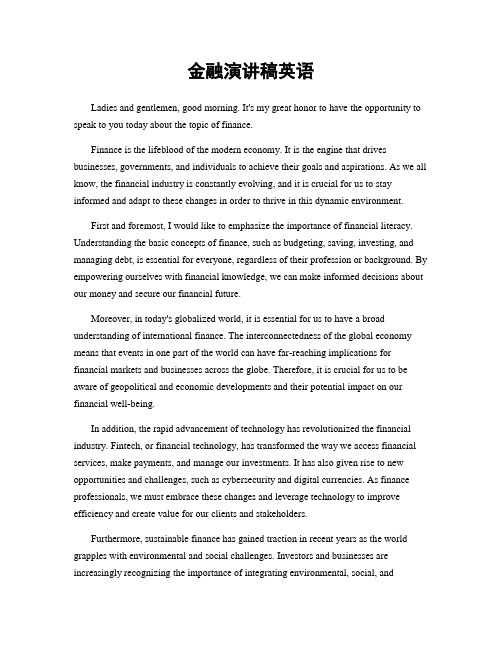
金融演讲稿英语Ladies and gentlemen, good morning. It's my great honor to have the opportunity to speak to you today about the topic of finance.Finance is the lifeblood of the modern economy. It is the engine that drives businesses, governments, and individuals to achieve their goals and aspirations. As we all know, the financial industry is constantly evolving, and it is crucial for us to stay informed and adapt to these changes in order to thrive in this dynamic environment.First and foremost, I would like to emphasize the importance of financial literacy. Understanding the basic concepts of finance, such as budgeting, saving, investing, and managing debt, is essential for everyone, regardless of their profession or background. By empowering ourselves with financial knowledge, we can make informed decisions about our money and secure our financial future.Moreover, in today's globalized world, it is essential for us to have a broad understanding of international finance. The interconnectedness of the global economy means that events in one part of the world can have far-reaching implications for financial markets and businesses across the globe. Therefore, it is crucial for us to be aware of geopolitical and economic developments and their potential impact on our financial well-being.In addition, the rapid advancement of technology has revolutionized the financial industry. Fintech, or financial technology, has transformed the way we access financial services, make payments, and manage our investments. It has also given rise to new opportunities and challenges, such as cybersecurity and digital currencies. As finance professionals, we must embrace these changes and leverage technology to improve efficiency and create value for our clients and stakeholders.Furthermore, sustainable finance has gained traction in recent years as the world grapples with environmental and social challenges. Investors and businesses are increasingly recognizing the importance of integrating environmental, social, andgovernance (ESG) factors into their decision-making processes. By aligning financial goals with sustainable development objectives, we can contribute to a more inclusive and environmentally responsible economy.In conclusion, finance is a multifaceted and ever-evolving field that requires continuous learning and adaptation. By enhancing our financial literacy, staying informed about global developments, embracing technological innovation, and promoting sustainable finance, we can navigate the complexities of the financial world and drive positive change in our organizations and communities.Thank you for your attention. I am confident that together, we can build a more prosperous and sustainable financial future.。
金融学英语版演讲稿范文
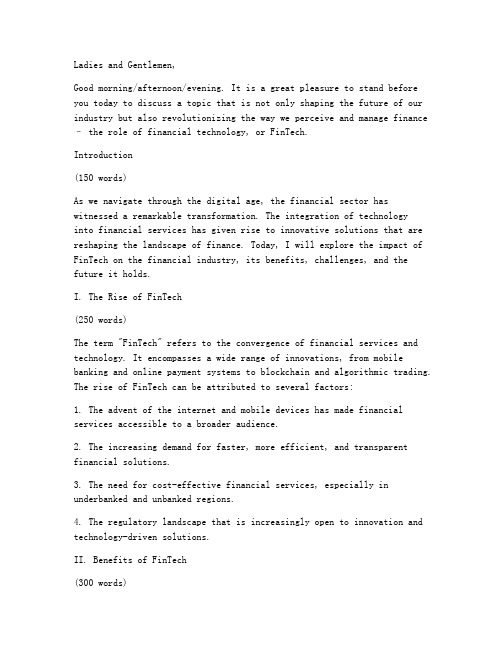
Ladies and Gentlemen,Good morning/afternoon/evening. It is a great pleasure to stand before you today to discuss a topic that is not only shaping the future of our industry but also revolutionizing the way we perceive and manage finance – the role of financial technology, or FinTech.Introduction(150 words)As we navigate through the digital age, the financial sector has witnessed a remarkable transformation. The integration of technologyinto financial services has given rise to innovative solutions that are reshaping the landscape of finance. Today, I will explore the impact of FinTech on the financial industry, its benefits, challenges, and the future it holds.I. The Rise of FinTech(250 words)The term "FinTech" refers to the convergence of financial services and technology. It encompasses a wide range of innovations, from mobile banking and online payment systems to blockchain and algorithmic trading. The rise of FinTech can be attributed to several factors:1. The advent of the internet and mobile devices has made financial services accessible to a broader audience.2. The increasing demand for faster, more efficient, and transparent financial solutions.3. The need for cost-effective financial services, especially in underbanked and unbanked regions.4. The regulatory landscape that is increasingly open to innovation and technology-driven solutions.II. Benefits of FinTech(300 words)The integration of technology in financial services has brought about numerous benefits:1. Enhanced Customer Experience: FinTech solutions offer convenience, speed, and personalized services that enhance customer satisfaction.2. Increased Accessibility: Financial services are now accessible to people who were previously excluded due to geographical or socio-economic barriers.3. Cost Reduction: Automation and digitization have significantly reduced operational costs for financial institutions.4. Improved Risk Management: Advanced analytics and predictive models enable better risk assessment and mitigation.5. Financial Inclusion: FinTech has played a crucial role in promoting financial inclusion by providing access to credit and other financial services to underserved populations.III. Challenges and Risks(250 words)Despite the numerous benefits, FinTech also presents challenges and risks:1. Security Concerns: The digitization of financial services has increased the risk of cyberattacks and data breaches.2. Regulatory Challenges: The rapid pace of innovation often outpaces regulatory frameworks, leading to regulatory arbitrage and legal uncertainties.3. Privacy Concerns: The collection and analysis of vast amounts of personal data raise privacy concerns.4. Market Disruption: The entry of FinTech players into traditional financial markets can disrupt established business models and market dynamics.IV. The Future of FinTech(300 words)Looking ahead, the future of FinTech appears promising, with several trends emerging:1. Blockchain Technology: Blockchain is expected to revolutionize the financial industry by providing secure, transparent, and decentralized solutions.2. Artificial Intelligence and Machine Learning: These technologies will enable more personalized services, better risk management, and improved decision-making.3. Internet of Things (IoT): IoT will play a significant role in the development of smart financial services, such as smart contracts and connected devices.4. Cross-Border Payments: Advances in payment technologies willfacilitate faster and more cost-effective cross-border transactions.5. Ecosystem Development: Collaboration between traditional financial institutions, FinTech startups, and tech giants will lead to the development of comprehensive financial ecosystems.Conclusion(150 words)In conclusion, the role of FinTech in shaping the future of finance is undeniable. While challenges and risks exist, the benefits ofintegrating technology into financial services are substantial. As we move forward, it is crucial for stakeholders to collaborate, innovate, and address the challenges to harness the full potential of FinTech and create a more inclusive and efficient financial system.Thank you for your attention, and I look forward to your questions and discussions.---Please note that this is a structured outline for a speech and not a complete, polished speech. The actual delivery would require the addition of transitions, elaboration on points, and engagement with the audience.。
金融学课前五分钟演讲稿
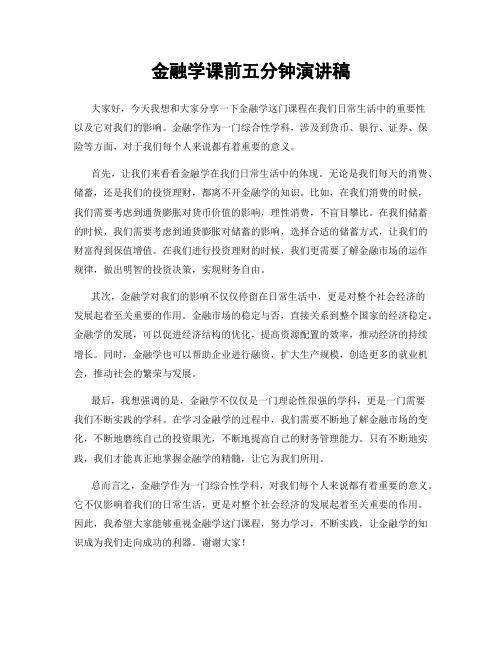
金融学课前五分钟演讲稿大家好,今天我想和大家分享一下金融学这门课程在我们日常生活中的重要性以及它对我们的影响。
金融学作为一门综合性学科,涉及到货币、银行、证券、保险等方面,对于我们每个人来说都有着重要的意义。
首先,让我们来看看金融学在我们日常生活中的体现。
无论是我们每天的消费、储蓄,还是我们的投资理财,都离不开金融学的知识。
比如,在我们消费的时候,我们需要考虑到通货膨胀对货币价值的影响,理性消费,不盲目攀比。
在我们储蓄的时候,我们需要考虑到通货膨胀对储蓄的影响,选择合适的储蓄方式,让我们的财富得到保值增值。
在我们进行投资理财的时候,我们更需要了解金融市场的运作规律,做出明智的投资决策,实现财务自由。
其次,金融学对我们的影响不仅仅停留在日常生活中,更是对整个社会经济的发展起着至关重要的作用。
金融市场的稳定与否,直接关系到整个国家的经济稳定。
金融学的发展,可以促进经济结构的优化,提高资源配置的效率,推动经济的持续增长。
同时,金融学也可以帮助企业进行融资,扩大生产规模,创造更多的就业机会,推动社会的繁荣与发展。
最后,我想强调的是,金融学不仅仅是一门理论性很强的学科,更是一门需要我们不断实践的学科。
在学习金融学的过程中,我们需要不断地了解金融市场的变化,不断地磨练自己的投资眼光,不断地提高自己的财务管理能力。
只有不断地实践,我们才能真正地掌握金融学的精髓,让它为我们所用。
总而言之,金融学作为一门综合性学科,对我们每个人来说都有着重要的意义。
它不仅影响着我们的日常生活,更是对整个社会经济的发展起着至关重要的作用。
因此,我希望大家能够重视金融学这门课程,努力学习,不断实践,让金融学的知识成为我们走向成功的利器。
谢谢大家!。
面对金融危机演讲稿索罗斯――索罗斯
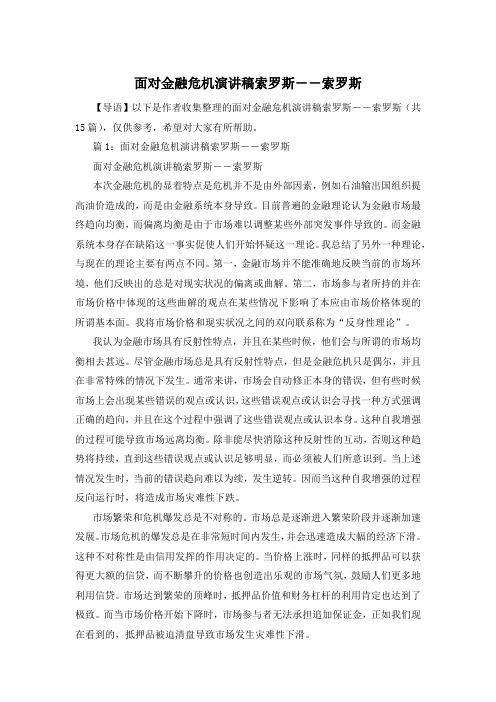
面对金融危机演讲稿索罗斯――索罗斯【导语】以下是作者收集整理的面对金融危机演讲稿索罗斯――索罗斯(共15篇),仅供参考,希望对大家有所帮助。
篇1:面对金融危机演讲稿索罗斯――索罗斯面对金融危机演讲稿索罗斯――索罗斯本次金融危机的显着特点是危机并不是由外部因素,例如石油输出国组织提高油价造成的,而是由金融系统本身导致。
目前普遍的金融理论认为金融市场最终趋向均衡,而偏离均衡是由于市场难以调整某些外部突发事件导致的。
而金融系统本身存在缺陷这一事实促使人们开始怀疑这一理论。
我总结了另外一种理论,与现在的理论主要有两点不同。
第一,金融市场并不能准确地反映当前的市场环境,他们反映出的总是对现实状况的偏离或曲解。
第二,市场参与者所持的并在市场价格中体现的这些曲解的观点在某些情况下影响了本应由市场价格体现的所谓基本面。
我将市场价格和现实状况之间的双向联系称为“反身性理论”。
我认为金融市场具有反射性特点,并且在某些时候,他们会与所谓的市场均衡相去甚远。
尽管金融市场总是具有反射性特点,但是金融危机只是偶尔,并且在非常特殊的情况下发生。
通常来讲,市场会自动修正本身的错误,但有些时候市场上会出现某些错误的观点或认识,这些错误观点或认识会寻找一种方式强调正确的趋向,并且在这个过程中强调了这些错误观点或认识本身。
这种自我增强的过程可能导致市场远离均衡。
除非能尽快消除这种反射性的互动,否则这种趋势将持续,直到这些错误观点或认识足够明显,而必须被人们所意识到。
当上述情况发生时,当前的错误趋向难以为续,发生逆转。
因而当这种自我增强的过程反向运行时,将造成市场灾难性下跌。
市场繁荣和危机爆发总是不对称的。
市场总是逐渐进入繁荣阶段并逐渐加速发展。
市场危机的爆发总是在非常短时间内发生,并会迅速造成大幅的经济下滑。
这种不对称性是由信用发挥的作用决定的。
当价格上涨时,同样的抵押品可以获得更大额的信贷,而不断攀升的价格也创造出乐观的市场气氛,鼓励人们更多地利用信贷。
金融学演讲课件
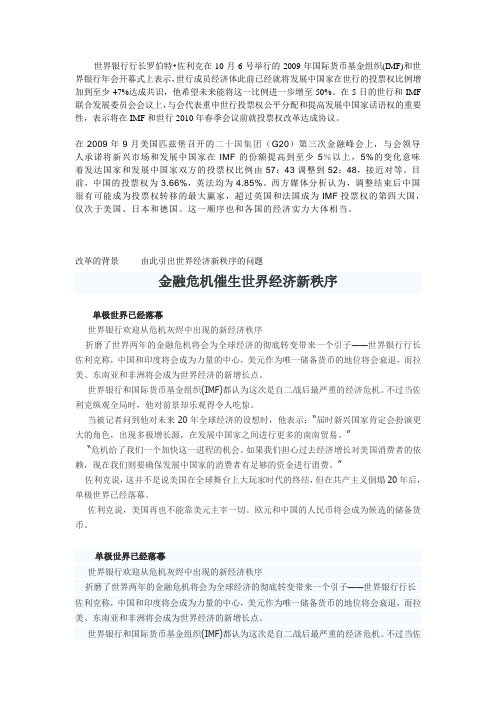
世界银行行长罗伯特•佐利克在10月6号举行的2009年国际货币基金组织(IMF)和世界银行年会开幕式上表示,世行成员经济体此前已经就将发展中国家在世行的投票权比例增加到至少47%达成共识,他希望未来能将这一比例进一步增至50%。
在5日的世行和IMF 联合发展委员会会议上,与会代表重申世行投票权公平分配和提高发展中国家话语权的重要性,表示将在IMF和世行2010年春季会议前就投票权改革达成协议。
在2009年9月美国匹兹堡召开的二十国集团(G20)第三次金融峰会上,与会领导人承诺将新兴市场和发展中国家在IMF的份额提高到至少5%以上,5%的变化意味着发达国家和发展中国家双方的投票权比例由57:43调整到52:48,接近对等。
目前,中国的投票权为3.66%,英法均为4.85%。
西方媒体分析认为,调整结束后中国很有可能成为投票权转移的最大赢家,超过英国和法国成为IMF投票权的第四大国,仅次于美国、日本和德国。
这一顺序也和各国的经济实力大体相当。
改革的背景由此引出世界经济新秩序的问题金融危机催生世界经济新秩序单极世界已经落幕世界银行欢迎从危机灰烬中出现的新经济秩序折磨了世界两年的金融危机将会为全球经济的彻底转变带来一个引子——世界银行行长佐利克称,中国和印度将会成为力量的中心,美元作为唯一储备货币的地位将会衰退,而拉美、东南亚和非洲将会成为世界经济的新增长点。
世界银行和国际货币基金组织(IMF)都认为这次是自二战后最严重的经济危机。
不过当佐利克纵观全局时,他对前景却乐观得令人吃惊。
当被记者问到他对未来20年全球经济的设想时,他表示:“届时新兴国家肯定会扮演更大的角色,出现多极增长源,在发展中国家之间进行更多的南南贸易。
”“危机给了我们一个加快这一进程的机会。
如果我们担心过去经济增长对美国消费者的依赖,现在我们则要确保发展中国家的消费者有足够的资金进行消费。
”佐利克说,这并不是说美国在全球舞台上大玩家时代的终结,但在共产主义倒塌20年后,单极世界已经落幕。
货币金融学演讲

负利率时代我们应该怎么做?
1、减少银行存款比例 2、进行多渠道投资 3、努力工作,赚更多的钱 4、投资自己,学习技能,不断发掘自己的潜能 ,培养和提高自身素质。
THANK YOU!
什么是负利பைடு நூலகம்?
所谓负利率,是指通货膨胀率高 过银行存款利率。在这种情形下 ,如果只把钱存在银行里,则财 富非但 没有增加,反而随着物价 上涨缩水的现象
负利率形成的原因:
国家的措施:
一. 加息:旨在改变负利率现状及应对沉重的通 胀压力,抑制投资 二.上调存款准备金率:即中央银行通过调整存 款准备金率,抑制金融机构的信贷扩张能力 ,从而间接调控货币供应量。
•
负利率对我们的影响:
一. 物价不断上涨,消费能力逐渐降低 二. 理财成为了一种难事,因为负利率,银行理 财产品及其他投资收益都会随之下降 三. 房地产市场成为了最大的赢家,使穷人更加 买不起房。 四. 贫富差距拉大,富人喜闻乐见的贷款利率下 降。而穷人对理财缺乏见解,甚至对投资无 可奈何。
负利率的积极性:
对拉动内需起到一定作用,钱贬值快,消 费会增加。 国内实体企业来说,融资成本会有大幅下 降。 对股市稳定繁荣起到推动作用。 有利于地方政府摆脱债务困局,政府发行 债券吸引资金的能力将大大提升,且可通 过低利率发债进行债务转换,大大降低融 资成本,缓解地方政府债务压力。 负利率贷款是处于实质性不断减少的状态 ,因此,对于有贷款一族而言,通过贷款 可以有效的对冲部分负利率冲击。
耶鲁大学金融演讲稿(3篇)
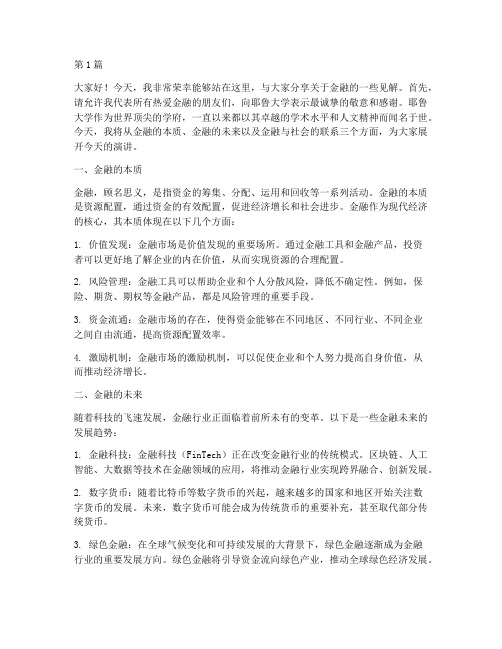
第1篇大家好!今天,我非常荣幸能够站在这里,与大家分享关于金融的一些见解。
首先,请允许我代表所有热爱金融的朋友们,向耶鲁大学表示最诚挚的敬意和感谢。
耶鲁大学作为世界顶尖的学府,一直以来都以其卓越的学术水平和人文精神而闻名于世。
今天,我将从金融的本质、金融的未来以及金融与社会的联系三个方面,为大家展开今天的演讲。
一、金融的本质金融,顾名思义,是指资金的筹集、分配、运用和回收等一系列活动。
金融的本质是资源配置,通过资金的有效配置,促进经济增长和社会进步。
金融作为现代经济的核心,其本质体现在以下几个方面:1. 价值发现:金融市场是价值发现的重要场所。
通过金融工具和金融产品,投资者可以更好地了解企业的内在价值,从而实现资源的合理配置。
2. 风险管理:金融工具可以帮助企业和个人分散风险,降低不确定性。
例如,保险、期货、期权等金融产品,都是风险管理的重要手段。
3. 资金流通:金融市场的存在,使得资金能够在不同地区、不同行业、不同企业之间自由流通,提高资源配置效率。
4. 激励机制:金融市场的激励机制,可以促使企业和个人努力提高自身价值,从而推动经济增长。
二、金融的未来随着科技的飞速发展,金融行业正面临着前所未有的变革。
以下是一些金融未来的发展趋势:1. 金融科技:金融科技(FinTech)正在改变金融行业的传统模式。
区块链、人工智能、大数据等技术在金融领域的应用,将推动金融行业实现跨界融合、创新发展。
2. 数字货币:随着比特币等数字货币的兴起,越来越多的国家和地区开始关注数字货币的发展。
未来,数字货币可能会成为传统货币的重要补充,甚至取代部分传统货币。
3. 绿色金融:在全球气候变化和可持续发展的大背景下,绿色金融逐渐成为金融行业的重要发展方向。
绿色金融将引导资金流向绿色产业,推动全球绿色经济发展。
4. 跨境金融:随着全球化的深入发展,跨境金融业务将越来越活跃。
跨境支付、跨境投资等业务将得到快速发展,为全球经济增长注入新动力。
武汉大学《货币金融学〉讲稿(3)
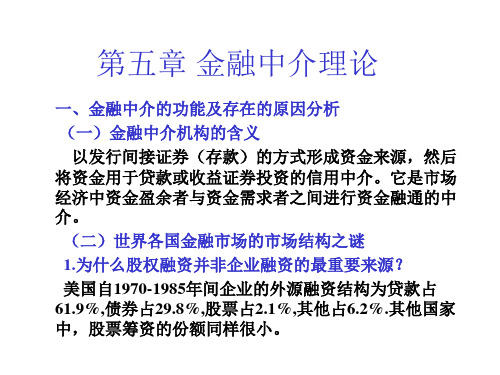
B.作为信息生产者,金融中介机构利用其信息生产及传 递方面的规模经济,能够在信息传递方面大规模地降低信 息传递的成本。 C.金融中介机构通过向资金需求者提供包括担保、资本 金要求等约束条款在内的各种贷款合同,能够有效地甑别 借款者的品质和类型,从而克服金融交易中的逆向选择问 题。 D.作为存款客户的委托监管者(Delegated Monitor), 金融中介机构在金融交易的事后道德风险的监督方面,具 有规模经济的优势,能够降低监督成本,克服监督中的搭 便车问题。 E.金融中介机构提供的债务合同以及合同中的抵押、资本 金要求条款能够有效地克服事后的道德风险问题。
(2)信息不对称下的逆向选择与道德风险 金融交易中的逆向选择(Adverse Selection):交易事前的信 息不对称下,最有可能造成不利结果或信贷风险的借款者往 择的结果是:优质的借款人退出金融交易市场,劣质 的借款者充斥市场,金融交易风险增加,贷款人要么提高交 易条件,要么减少资金贷出量,或者进行信贷配给(Credit rationing);极端的情况下,有可能导致交易的闭锁。 金融交易中的道德风险(Moral Hazard):交易事后的信息 不对称下,借款者可能从事从贷款者角度来看不希望看到的 各种活动的风险。道德风险也有可能导致不拥有信息的一方 在事前退出交易。
这样, 资本充足率 =资本额÷(加权风险资产+加权表外项目)×100% 4.商业银行存款构成 (1)交易存款:客户可对其账户签发支票,用于日常支 付的存款。包括:活期存款、可转让支付命令账户、自动转 账服务账户、货币市场存款账户。 (2)储蓄存款:公众为了将来的消费,将当期暂时不用 的收入积蓄起来的存款。 (3)定期存款:规定期限、不能提前提款的有息存款。多 采用定期存款单的方式。包括:可转让的大额定期存款单、货 币市场利率联动存款单等。 5.商业银行的借款构成 (1)向央行借款:短期调节性贷款、季节性贷款、紧急贷 款。多采用在抵押和再贴现方式。
金融三分钟精彩演讲稿
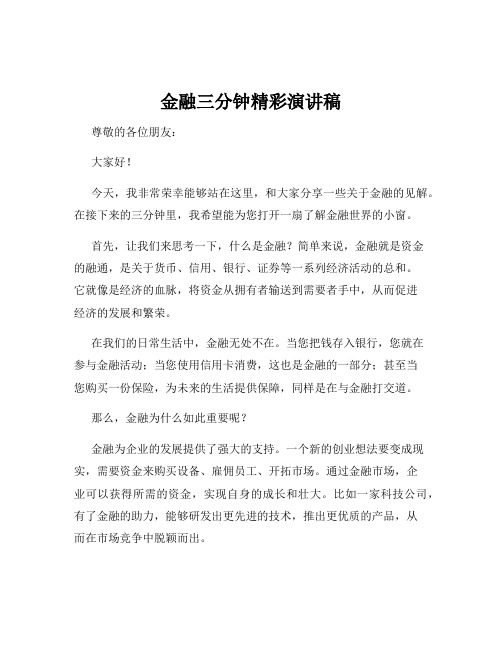
金融三分钟精彩演讲稿尊敬的各位朋友:大家好!今天,我非常荣幸能够站在这里,和大家分享一些关于金融的见解。
在接下来的三分钟里,我希望能为您打开一扇了解金融世界的小窗。
首先,让我们来思考一下,什么是金融?简单来说,金融就是资金的融通,是关于货币、信用、银行、证券等一系列经济活动的总和。
它就像是经济的血脉,将资金从拥有者输送到需要者手中,从而促进经济的发展和繁荣。
在我们的日常生活中,金融无处不在。
当您把钱存入银行,您就在参与金融活动;当您使用信用卡消费,这也是金融的一部分;甚至当您购买一份保险,为未来的生活提供保障,同样是在与金融打交道。
那么,金融为什么如此重要呢?金融为企业的发展提供了强大的支持。
一个新的创业想法要变成现实,需要资金来购买设备、雇佣员工、开拓市场。
通过金融市场,企业可以获得所需的资金,实现自身的成长和壮大。
比如一家科技公司,有了金融的助力,能够研发出更先进的技术,推出更优质的产品,从而在市场竞争中脱颖而出。
对于个人而言,金融更是关系到我们生活的方方面面。
它帮助我们规划未来,实现财务目标。
比如通过储蓄和投资,我们可以为子女的教育、自己的养老提前做好准备。
合理的金融规划还能让我们在面临突发情况时,有足够的资金应对,保障生活的稳定。
然而,金融世界并非一帆风顺,它也充满了风险和挑战。
市场的波动是金融领域常见的现象。
股票价格的涨跌、汇率的变动、利率的调整,都可能对投资者和企业造成巨大的影响。
就像一场风暴,可能会让一些人的财富瞬间缩水,也可能给一些企业带来沉重的打击。
金融诈骗也是我们需要警惕的问题。
一些不法分子利用人们对金融知识的缺乏和对高收益的渴望,设计各种骗局。
比如虚假的投资项目、网络诈骗等,让很多人遭受了巨大的经济损失。
面对金融世界的复杂和多变,我们应该如何应对呢?首先,要不断学习金融知识。
了解基本的金融概念、投资原则和风险防范方法,能够让我们在金融市场中更加从容自信。
其次,要保持理性和冷静。
经济金融演讲稿大学生

大家好!今天,我很荣幸站在这里,与大家分享一些关于经济金融的知识和思考。
随着我国经济的快速发展,经济金融已经成为当代大学生必须关注的重要领域。
在这个充满机遇与挑战的时代,了解经济金融知识,培养金融素养,对于我们大学生来说至关重要。
以下是我对经济金融的一些思考,希望能给大家带来一些启示。
一、经济金融的重要性1. 经济金融是社会发展的重要基础。
一个国家的经济发展离不开金融的支持,金融体系是现代经济体系的重要组成部分。
金融业的发展,有助于提高资源配置效率,促进经济增长。
2. 经济金融对个人生活的影响日益加深。
随着金融市场的不断发展,金融产品和服务日益丰富,个人在投资、理财、消费等方面越来越依赖于金融。
了解经济金融知识,有助于我们更好地规划个人财务,提高生活质量。
3. 经济金融是国家治理的重要内容。
金融安全、金融稳定是国家治理体系和治理能力现代化的重要方面。
大学生作为国家未来的建设者,了解经济金融知识,有助于我们更好地为国家治理贡献力量。
二、经济金融的基本知识1. 经济学原理。
经济学是研究资源稀缺、资源配置和经济增长的学科。
掌握经济学原理,有助于我们理解经济现象,分析经济问题。
2. 金融学基础。
金融学是研究货币、金融市场、金融机构及其运行规律的学科。
了解金融学基础,有助于我们认识金融市场,掌握金融工具。
3. 金融市场与金融工具。
金融市场是金融资源交易的平台,金融工具是金融交易的对象。
了解金融市场和金融工具,有助于我们把握市场动态,进行理性投资。
4. 国际金融。
随着经济全球化的不断深入,国际金融对各国经济的影响日益显著。
了解国际金融知识,有助于我们把握全球经济形势,提高国际竞争力。
三、大学生如何提高经济金融素养1. 学习经济金融知识。
大学生应主动学习经济学、金融学等课程,了解经济金融的基本原理和运行规律。
2. 关注经济金融动态。
通过阅读报刊、杂志、网络等渠道,了解国内外经济金融形势,提高自己的洞察力。
3. 参与实践活动。
- 1、下载文档前请自行甄别文档内容的完整性,平台不提供额外的编辑、内容补充、找答案等附加服务。
- 2、"仅部分预览"的文档,不可在线预览部分如存在完整性等问题,可反馈申请退款(可完整预览的文档不适用该条件!)。
- 3、如文档侵犯您的权益,请联系客服反馈,我们会尽快为您处理(人工客服工作时间:9:00-18:30)。
•
负利率对我们的影响:
一. 物价不断上涨,消费能力逐渐降低 二. 理财成为了一种难事,因为负利率,银行理 财产品及其他投资收益都会随之下降 三. 房地产市场成为了最大的赢家,使穷人更加 买不起房。 四. 贫富差距拉大,富人喜闻乐见的贷款利率下 降。而穷人对理财缺乏见解,甚至对投资无 可奈何。
负利率的积极性:
负利率时代我们应该怎么做?
1、减少银行存款比例 2、进行多渠道投资 3、努力工作,赚更多的钱 4、投资自己,学习技能,不断发掘自己的潜能 ,培养和提高自身素质。
THANK YOU!
对拉动内需起到一定作用,钱贬值快,消 费会增加。 国内实体企业来说,融资成本会有大幅下 降。 对股市稳定繁荣起到推动作用。 有利于地方政府摆脱债务困局,政府发行 债券吸引资金的能力将大大提升,且可通 过低利率发债进行债务转换,大大降低融 资成本,缓解地方政府债务压力。 负利率贷款是处于实质性不断减少的状态 ,因此,对于有贷款一族而言,通过贷款 可以有效的对冲部分负利率冲击。
什么是负利率?
所谓负利率,是指通货膨胀率高 过银行Байду номын сангаас款利率。在这种情形下 ,如果只把钱存在银行里,则财 富非但 没有增加,反而随着物价 上涨缩水的现象
负利率形成的原因:
国家的措施:
一. 加息:旨在改变负利率现状及应对沉重的通 胀压力,抑制投资 二.上调存款准备金率:即中央银行通过调整存 款准备金率,抑制金融机构的信贷扩张能力 ,从而间接调控货币供应量。
